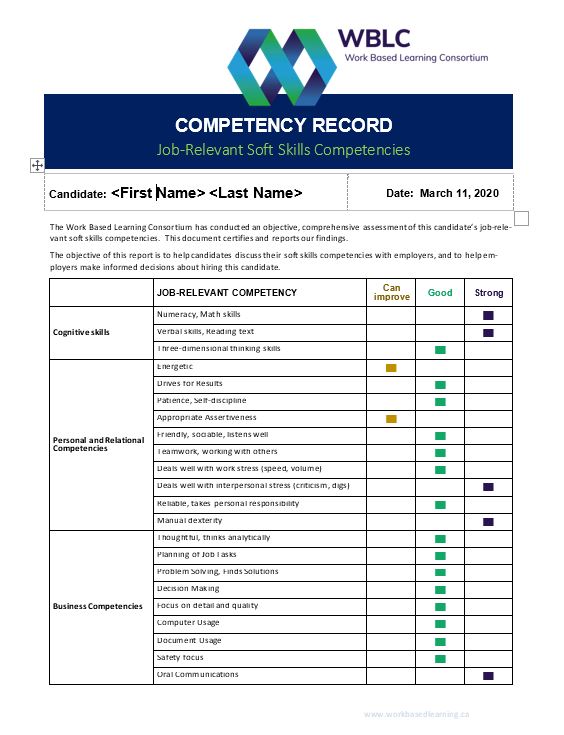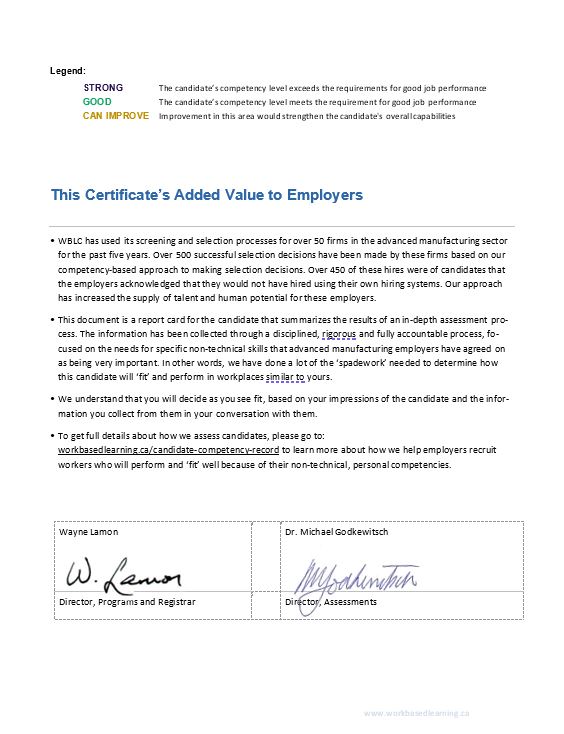WBLC COMPETENCY RECORD
If you are reading this page, it’s likely you have a WBLC Competency Record – Job-Relevant Soft Skills Competencies (see example below) in front of you and want to learn more this document – what information it provides, what value it may have for you, whether you can rely on it or believe what it indicates about the job seeker who presented it to you.


Frequently Asked Questions
Here are some frequently asked questions. If you need additional information, please contact Rod Jones, Managing Director, WBLC, at rod.jones@workbasedlearning.ca
Why does WBLC provide this Competency Record?
WBLC is interested in helping employers improve their selection/hiring decisions. We have created a portable Competency Record that job candidates can provide to employers, Employment Service Providers, private placement agencies and related organizations. The intent of this Competency Record is to provide relevant information to these parties that allows them to evaluate more effectively the candidate holding the Record, focusing on their ‘soft skills’ competencies.
WBLC is the issuing organization. We stand behind our assessments and our objective of assisting both job seekers and employers to make more informed, objective selection decisions that will benefit both.
Who receives a WBLC Competency Record?
Candidates who pass our WBLC Assessment Process each receive their Competency Record. This means that any Candidate holding this WBLC Competency Record is fully ready for placement in a training, entry or mid-level position, and is likely to perform well in training and on the job, to stay with the employer for at least an acceptable duration, and to experience job satisfaction.
An additional point of importance is that many of these Candidates holding a WBLC Competency Record have the capacity to advance in the job and qualify for positions of higher levels of responsibility or technical challenge.
What information does the Competency Record contain?
The Competency Record graphically shows where the Candidate’s ‘soft skills’ competencies are strong and exceed job competency requirements, where their competencies meet the job requirements, and finally in which competence areas some further development would strengthen the overall capability of the Candidate, without holding them back from performing well on the job at this point.
What are ‘Soft Skills’ competencies?
These are the important non-technical and non-occupational knowledge, skills, abilities, aptitudes and attributes that form a person’s overall tool set to use on the job (or in job training). Technical / occupational competencies can be learned in training or on the job.
We focus on non-technical ‘soft skills’ competencies that we have proven to correlate with, or directly cause good job performance so that they can be used as standards to recruit, select, train, and hire workers.
Let’s illustrate by use of an example. Most people agree that to perform well when the job pace is fast, a candidate should be good at dealing with that pace and not be stressed, make many mistakes, produce too much scrap, or ignore safety. This cannot readily be tested in a selection situation such as an interviewer’s office. To make an informed decision – we use validated, on-line administered tests to measure this competency. This means that we have scientific and rigorous evidence that people who do well on this test are good at dealing constructively with such job stress and vice versa. When test scores significantly predict job performance and satisfaction, our measures are direct. And we do not have to rely on testimony of references which may or may not be accurate or wonder if the applicant is presenting themselves better than they are, or even making up facts.
What is the value of the Certificate to the reader?
The Competency Report provides a reliable and objective analysis from an independent third party – WBLC. This brief document is a kind of ‘report card’ for the candidate that summarizes the results of an in-depth assessment process. The information has been collected in a disciplined, rigorous and fully accountable process, focused on the needs for specific ‘soft skills’ (non-technical skills) that employers in the advanced manufacturing sector have agreed are very important. In other words, WBLC has done a lot of the ‘spadework’ needed to determine how this candidate will ‘fit’ and perform in similar workplaces.
Whether or not a Candidate has acquired the technical competencies needed for a particular skilled job, they must have the necessary soft skills competencies to perform well. When interviewers need to select candidates to be hired for job openings in an entry- to mid-level skilled job or a training position, they usually interview applicants and review their work experience, resumes and references. These activities are intended to assess how much competence the applicant possesses, in order to feel confident of recommending or hiring this candidate. These assessments are indirect, in that the interviewer does not actually have an opportunity to witness the applicant doing the job.
WBLC’s approach is more direct: we articulate and operationalize specific job-relevant occupational competencies so we can measure them directly in job applicants, rather than making inferences about these competencies by extrapolating from applicants’ previous work experiences, from their formal qualifications, from what they claim in interviews, or from what references say they have witnessed. (Of course, we still collect information about previous work experience to gauge applicant’s familiarity with the work environment.)
Can you be more specific about what soft skills competencies WBLC measures and how you do that?
For each WBLC program, we review and confirm a specific, customized set of ‘soft skills’ competencies which reflects what focus groups of employers in this program find important. The objective is to understand, based on the advice of industry job-experts, which soft skills competencies are more valued than others for their jobs as compared to other sectors. This allows WBLC to ensure a significantly higher degree of “fit” between our candidates and the desired job- relevant competencies as compared to non-WBLC candidates.
The usual ‘soft skills’ competencies measured by our WBLC Assessment Process include:
Cognitive Skills: Numeracy and math skills, Verbal skills and reading text, and Three-dimensional thinking skills
Personal and Relational Competencies: Energy level, Driving for success and results, Patience and self-discipline, Appropriate assertiveness, Friendly, sociable and listening well, Teamwork and working with others, Dealing with work stress (speed, volume), Dealing with interpersonal stress (criticism, digs), Being reliable and taking personal responsibility, Manual dexterity (as appropriate).
Business Competencies: Thinking analytically, Planning of job tasks, Problem-solving and finding solutions, Decision-making, Focusing on detail and quality, Computer usage, Document usage, Safety focus, and Oral communications.
Part 1 of the WBLC Assessment Process to reveal an applicant’s ‘soft skills’ competencies is a series of three (3) online tests:
- Test 1 measures the applicant’s skills in three areas:
- ‘spatial’, three-dimensional thinking skills
- verbal skills
- numerical skills
- Test 2 assesses the applicant’s required social and personal competencies, e.g., being energetic, patient, appropriately assertive, sociable, friendly, thoughtful, listening well, and dealing effectively with work stressors (such as work load) and interpersonal stressors (such as criticism).
- Test 3 measures the degree to which the applicant ‘fits’ with the key requirements of being interested and motivated in the job, making good use of documentation, working well with others, having a focus on quality, detail and safety, generally enjoying doing concrete, routine work that requires some physical effort, and being reliable and responsible.
Part 2 of the WBLC Assessment Process is a structured face-to-face interview. Experienced, interviewers, trained by WBLC in conducting competency-based interviews, ask specific questions about job-relevant competencies, record the answers verbatim, and then score them for ‘goodness’ against specified criteria. Questions about physical competence cover the needs for any potential job-specific accommodations. A formal test of Manual Dexterity is administered when dexterity is deemed to be a key competency in the target job.
Part 3 of the WBLC Assessment Process is a review of the results of the online tests and the interviewer’s report by WBLC’s industrial psychologist, and preparation of the Competency Record.
What does a WBLC Competency Record indicate about the technical competencies that the candidate possesses?
The document summarizes the candidate’s employment-related competencies, but only those that are NOT ‘technical’. Employers are generally good at assessing technical competencies. Many have indicated to us that they need assistance in evaluating the softer relational and employability competencies. For that reason, we have focused the WBLC Assessment Process and the resulting Competency Record on proven job-relevant soft skills (non-technical) competencies.
Summary
The WBLC Competency Record on Job-Relevant Soft Skills Competencies offers you a very detailed picture of the applicant that provides you with a valid and reliable evaluation of their relevant Cognitive, Personal and Relational, and Business Competencies. You can be confident about the assessments we have made regarding the Candidate in front of you.
